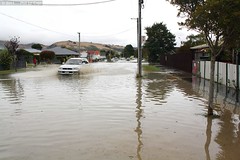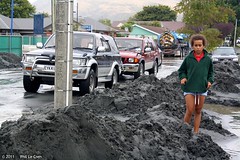
Search
Images for canterbury; more images...
Red zone land has no legal status.
Audio, Radio New Zealand
The Canterbury Earthquake Recovery Authority has confirmed land zoned red in Christchurch has no legal status.
Christchurch earthquake class action heads to court
Audio, Radio New Zealand
A class action taken by 40 Canterbury earthquake claimants against Southern Response heads to court tomorrow.
CERA ceases to exist from today
Articles, TV3
The Canterbury Earthquake Recovery Authority is no more but questions remain about the future of Christchurch.
Christchurch Press Image: Stacy Squires 2010:09:15 16:02:07
Images, UC QuakeStudies
Photograph captioned by Fairfax, "Christchurch earthquake. Jason Kerrison (OpShop frontman) this afternoon at Canterbury University
Photograph by Jocelyn Kinghorn 510
Images, UC QuakeStudies
Damage to the Canterbury Provincial Chambers. The walls have crumbled, revealing the inside of the building.
Christchurch Press Image: John Kirk-Anderson 2010:09:06 17:41:15
Images, UC QuakeStudies
Photograph captioned by Fairfax, "John Ware, CEO Red Cross, during a press conference following Canterbury's earthquake".
Christchurch Press Image: John Kirk-Anderson 2010:09:06 17:34:19
Images, UC QuakeStudies
Photograph captioned by Fairfax, "Rob Saunders, NZ Fire Service, during a press conference following Canterbury's earthquake".
Future Christchurch
Other, National Library of New Zealand
Christchurch City Council website on the infrastructure rebuild of Christchurch following the 2010 and 2011 earthquakes. Includes news; information on SMART building; projects related to rebuilding of facilities, transport, suburban centres and the central city.
Christchurch Press Infographic: 11 December 2012 (1)
Images, UC QuakeStudies
An incomplete front page layout featuring an article about the Royal Commission enquiry into the CTV building collapse.
Fairfax Video, March 2012 (8)
Videos, UC QuakeStudies
A video of the Christchurch Wizard speaking outside the Canterbury Museum about the restoration of the ChristChurch Cathedral.
UCSA Events Centre Photograph 1
Images, UC QuakeStudies
A photograph of the exterior of the UCSA Events Centre, built in the UCSA car park on Ilam Road.
UCSA Events Centre Photograph 2
Images, UC QuakeStudies
A photograph of the exterior of the UCSA Events Centre, built in the UCSA car park on Ilam Road.
UCSA Events Centre Photograph 6
Images, UC QuakeStudies
A photograph of the exterior of the UCSA Events Centre, built in the UCSA car park on Ilam Road.
UCSA Events Centre Photograph 3
Images, UC QuakeStudies
A photograph of the exterior of the UCSA Events Centre, built in the UCSA car park on Ilam Road.
Helping children cope with the ongoing impact of the Canterbury earthquakes
Audio, Radio New Zealand
How do you help children cope with a life-threatening incident? And what if you’re stressed yourself? Katy Gosset looks at the far reaching emotional effects of the Canterbury earthquakes.
Hundreds of Canterbury homeowners only now deemed overcap by EQC
Audio, Radio New Zealand
More than four years after earthquakes first damaged home in Christchurch, hundreds of Canterbury homeowners are finding out that they may have to wait another two years before their damaged homes are repaired.
Geotechnical & flooding reconnaissance of the 2014 March flood event post …
Research papers, University of Canterbury Library
None
_MG_7969
Images, eqnz.chch.2010
Took this back in September after the Canterbury quake - gives a different perspective on how powerful this really was.
my roof tiles
Images, eqnz.chch.2010
waiting for assessment the pattern of the aftershock since Saturday the 04/09/2010 www.stuff.co.nz/national/canterbury-earthquake/4114666/Qu...
Nisbet, Alastair, 1958- :Parts of Canterbury still moving and settling...5…
Images, Alexander Turnbull Library
Under the caption, young people carrying their baggage flutter into the air, away from Canterbury and toward 'Oz'. In September GNS Earth Sciences reported that after the earthquakes, the Greendale and associated faults were still moving as they settled into a new configuration. At the same time the young were leaving Canterbury (and New Zealand) for a better future in Australia. The population of New Zealand was moving into a new configuration. Quantity: 1 digital cartoon(s).
The Recovery of Canterbury’s Organisations:A comparative analysis of the 4…
Research papers, University of Canterbury Library
The 4 September, 22 February, and 13 June earthquakes experienced in Canterbury, New Zealand would have been significant events individually. Together they present a complex and unprecedented challenge for Canterbury and New Zealand. The repetitive and protracted nature of these events has caused widespread building and infrastructure damage, strained organisations’ financial and human resources and challenged insurer and investor confidence. The impact of the earthquakes was even more damaging coming in the wake of the worst worldwide recession since the great depression of the 1930s. However, where there is disruption there is also opportunity. Businesses and other organisations will drive the physical, economic and social recovery of Canterbury, which will be a dynamic and long-term undertaking. Ongoing monitoring of the impacts, challenges and developments during the recovery is critical to maintaining momentum and making effective mid-course adjustments. This report provides a synthesis of research carried out by the Resilient Organisations (ResOrgs) Research Programme1 at the University of Canterbury and Recover Canterbury in collaboration with Opus Central Laboratories (part of Opus International Consultants). The report includes discussions on the general state of the economy as well as data from three surveys (two conducted by ResOrgs and one by Recover Canterbury) on business impacts of the earthquakes, population movements and related economic recovery issues. This research and report offers two primary benefits:
Canterbury Health System Earthquake Memories, Story 39: An unforgettable d…
Articles, UC QuakeStudies
An earthquake memories story from Niall Hamilton, Medical Registrar, Christchurch Hospital, titled, "An unforgettable day".
Canterbury Health System Earthquake Memories, Story 31: Understanding stru…
Articles, UC QuakeStudies
An earthquake memories story from Evon Currie, General Manager, Population and Public Health, titled, "Understanding structure vital".
Canterbury Health System Earthquake Memories, Story 30: Surfing on asphalt
Articles, UC QuakeStudies
An earthquake memories story from Paul Schoolderman, Health Protection Officer, Community and Public Health, titled, "Surfing on asphalt".
Canterbury Health System Earthquake Memories, Story 08: Focus on the patie…
Articles, UC QuakeStudies
An earthquake memories story from Pleayo Tovaranonte, Medical Registrar, Christchurch Hospital, titled, "Focus on the patients you can help".
Canterbury Health System Earthquake Memories, Story 50: Not just another d…
Articles, UC QuakeStudies
An earthquake memories story from Christina MacLachlan, Registrar, Christchurch Hospital, titled, "Not just another day at the office: ICU".
Canterbury Health System Earthquake Memories, Story 10: Earthquakes not en…
Articles, UC QuakeStudies
An earthquake memories story from Richard Clinghan, Resident Medical Officer, titled, "Earthquakes not enough to put off British doctors".
Canterbury Health System Earthquake Memories, Story 28: Long road to recov…
Articles, UC QuakeStudies
An earthquake memories story from Debbie Smith, Health Protection Officer, Community and Public Health, titled, "Long road to recovery".
Canterbury Health System Earthquake Memories, Story 18: A sonographer's st…
Articles, UC QuakeStudies
An earthquake memories story from Rex de Ryke, Charge Sonographer, Radiology Service, titled, "A sonographer's story".
Canterbury Health System Earthquake Memories, Story 26: Suddenly the screa…
Articles, UC QuakeStudies
An earthquake memories story from Malcolm Walker, Health Protection Officer, Community and Public Health, titled, "Suddenly the screaming started".



